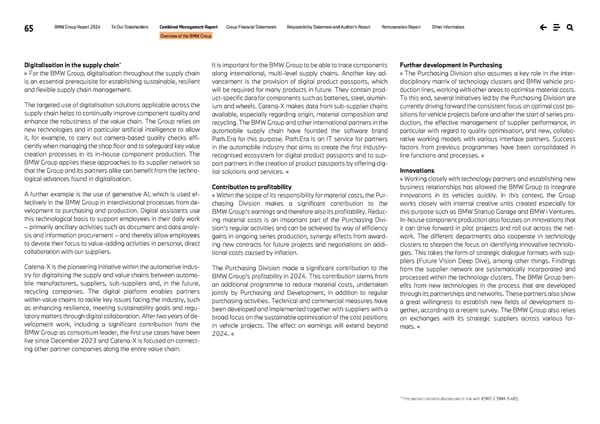65 BMW Group Report 2024 To Our Stakeholders Combined Management Report Group Financial Statements Responsibility Statement and Auditor’s Report Remuneration Report Other Information Overview of the BMW Group Digitalisation in the supply chain* » For the BMW Group, digitalisation throughout the supply chain is an essential prerequisite for establishing sustainable, resilient and flexible supply chain management. The targeted use of digitalisation solutions applicable across the supply chain helps to continually improve component quality and enhance the robustness of the value chain. The Group relies on new technologies and in particular artificial intelligence to allow it, for example, to carry out camera-based quality checks effi- ciently when managing the shop floor and to safeguard key value creation processes in its in-house component production. The BMW Group applies these approaches to its supplier network so that the Group and its partners alike can benefit from the techno- logical advances found in digitalisation. A further example is the use of generative AI, which is used ef- fectively in the BMW Group in interdivisional processes from de- velopment to purchasing and production. Digital assistants use this technological basis to support employees in their daily work – primarily ancillary activities such as document and data analy- sis and information procurement – and thereby allow employees to devote their focus to value-adding activities in personal, direct collaboration with our suppliers. Catena-X is the pioneering initiative within the automotive indus- try for digitalising the supply and value chains between automo- bile manufacturers, suppliers, sub-suppliers and, in the future, recycling companies. The digital platform enables partners within value chains to tackle key issues facing the industry, such as enhancing resilience, meeting sustainability goals and regu- latory matters through digital collaboration. After two years of de- velopment work, including a significant contribution from the BMW Group as consortium leader, the first use cases have been live since December 2023 and Catena-X is focused on connect- ing other partner companies along the entire value chain. It is important for the BMW Group to be able to trace components along international, multi-level supply chains. Another key ad- vancement is the provision of digital product passports, which will be required for many products in future. They contain prod- uct-specific data for components such as batteries, steel, alumin- ium and wheels. Catena-X makes data from sub-supplier chains available, especially regarding origin, material composition and recycling. The BMW Group and other international partners in the automobile supply chain have founded the software brand Path.Era for this purpose. Path.Era is an IT service for partners in the automobile industry that aims to create the first industry- recognised ecosystem for digital product passports and to sup- port partners in the creation of product passports by offering dig- ital solutions and services. « Contribution to profitability » Within the scope of its responsibility for material costs, the Pur- chasing Division makes a significant contribution to the BMW Group’s earnings and therefore also its profitability. Reduc- ing material costs is an important part of the Purchasing Divi- sion’s regular activities and can be achieved by way of efficiency gains in ongoing series production, synergy effects from award- ing new contracts for future projects and negotiations on addi- tional costs caused by inflation. The Purchasing Division made a significant contribution to the BMW Group’s profitability in 2024. This contribution stems from an additional programme to reduce material costs, undertaken jointly by Purchasing and Development, in addition to regular purchasing activities. Technical and commercial measures have been developed and implemented together with suppliers with a broad focus on the sustainable optimisation of the cost positions in vehicle projects. The effect on earnings will extend beyond 2024. « Further development in Purchasing » The Purchasing Division also assumes a key role in the inter- disciplinary matrix of technology clusters and BMW vehicle pro- duction lines, working with other areas to optimise material costs. To this end, several initiatives led by the Purchasing Division are currently driving forward the consistent focus on optimal cost po- sitions for vehicle projects before and after the start of series pro- duction, the effective management of supplier performance, in particular with regard to quality optimisation, and new, collabo- rative working models with various interface partners. Success factors from previous programmes have been consolidated in line functions and processes. « Innovations » Working closely with technology partners and establishing new business relationships has allowed the BMW Group to integrate innovations in its vehicles quickly. In this context, the Group works closely with internal creative units created especially for this purpose such as BMW Startup Garage and BMW i Ventures. In-house component production also focuses on innovations that it can drive forward in pilot projects and roll out across the net- work. The different departments also cooperate in technology clusters to sharpen the focus on identifying innovative technolo- gies. This takes the form of strategic dialogue formats with sup- pliers (Future Vision Deep Dive), among other things. Findings from the supplier network are systematically incorporated and processed within the technology clusters. The BMW Group ben- efits from new technologies in the process that are developed through its partnerships and networks. These partners also show a great willingness to establish new fields of development to- gether, according to a recent survey. The BMW Group also relies on exchanges with its strategic suppliers across various for- mats. « * This section contains disclosures in line with ESRS 2 SBM-3.48f).
 BMW Group Report 2024 Page 64 Page 66
BMW Group Report 2024 Page 64 Page 66